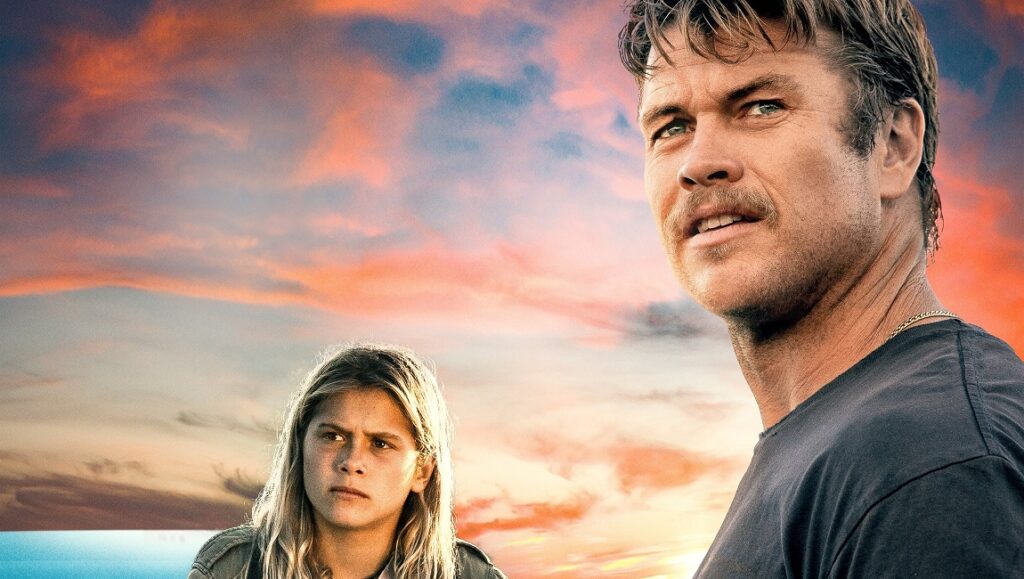When it comes to metaphorical expressions, perhaps no other narrative and visual motif can provide a sense of boundless liberation and spiritual freedom as much as the vast, open oceans do. And as the title of Tyler Atkins’ feature debut quite obviously suggests, Ocean Boy is a film filled with those very invigorating and unbridled impressions of liberation. Set in the coastal area of ‘90s New South Wales and inspired by true events, this Australian indie follows the father-son pair of Bosch and Rockit. Father (Luke Hemsworth), a good-looking romancer and rough-and-tumble pot producer and dealer, and son (Rasmus King), a somewhat naïve, long-haired moppet who is bullied at his local school and misses his mother, Elizabeth (Leeanna Walsman), easily form a tight familial bond, regardless of their evident differences.
Soon after an unexpected fire sets the local woods ablaze, Bosch is forced to leave his stash behind, and without Rockit’s knowledge about his father’s true illegal activities, the two embark on a supposed holiday to Byron Bay, a narrative turn which subsequently renders Ocean Boy one part a mild stoner flick and the other a smoothly atmospheric road movie. Thankfully, amidst all this, Atkins deliberately never skews the film into the territory of what viewers may expect to be a type of on-the-run actioner or a tension-forward thriller. This despite the fact that the director sets a couple of minor and relatively easily solvable challenges for Bosch and Rockit — specifically, when Bosch is troubled by the presence of a corrupt detective (Martin Sacks) breathing down his neck. What explicitly fascinates Atkins here is the delicate regard for and uplifting chemistry of the characters, both with each other and with their natural surroundings.
Visually, considering the gentle (even postcard-y) landscapes and natural lights, and sonically, on the tenor of the gentle acoustic guitar riffs and ocean waves, Ocean Boy constructs a very relaxed, emotive world with a fair amount of feel-good verve and blissful vibes. Thanks to the solid performances, especially when it comes to father and son encountering Deb (Isabel Lucas) and Ash-Ash (Savannah La Rain) during their stay in Byron, the film’s committed emotionalism achieves a strength and appeal; the two women, autonomous and distinctive in their own right, also highlight the shattered and alienated nature of masculine fragility. But one shouldn’t mistake Ocean Boy for a profoundly romantic document either: it’s true that Atkins employs a mellow rhythm to keep things existing at the surface — at times even to the degree of cornball status — but it’s in accord with the film on the whole. Put differently, for Atkins, who himself was an avid surfer and grew up around the Australian beach culture, it seems the priority is to capture a particular essence, speaking to the specificity of a breezy moodiness of chill and cheer.
Regardless of its obviously humble, low-key TV movie aesthetic scope — specifically during its frequent slo-mo interludes that capture surfing activities or the livelihood of natural landscapes populated by dolphins and whales, in alternately travel vlog or ambient music video fashion — the film specifically works as a hippie-centric, perhaps even mystical, low-budget work that, through various streams and undercurrents of unassuming events, prefers to move according to the tender flow of life rather than trouble itself with the weight of grander turbulences. Indeed, if Ocean Boy offers audiences anything in the vein of the meaningful, it’s surely found in the film’s presentation of burning longing for one’s own inner liberation and the act of reclaiming a knotty reconciliation with both others and the world — beyond our suffocating and superficial societal entanglements, demands, and pressures.
Published as part of InRO Weekly — Volume 1, Issue 5.


Comments are closed.